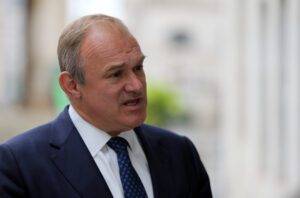Trips to the supermarket are back on shoppers’ lists

Consumers have rushed back to supermarkets for their Christmas food shopping, notching up the highest number of visits to stores since the stockpiling frenzy at the start of the pandemic.
Grocery sales hit £11.7 billion last month and £31.7 billion in the 12 weeks up to Boxing Day, according to Kantar, the market research group. The sales are 3 per cent lower than 2020 levels when tougher coronavirus restrictions were in place, so people bought more food to eat at home, but 8 per cent higher than in 2019.
Despite rising cases of Covid-19, due to the spread of the Omicron variant, and isolation requirements, online grocery sales fell by 3.7 per cent in December compared with the previous year. As a result, online sales accounted for 12.2 per cent of total food sales, down from the 14 per cent recorded during the height of the pandemic.
In the run-up to the festive season there were concerns that supply chain challenges and labour shortages would result in gaps on shelves and shortages of key items, such as turkeys. However, customers appeared to be confident that their local superstores would have the goods they wanted.
Fraser McKevitt, head of insight at Kantar, said: “The real driver of bumper sales on December 23 wasn’t online as we saw the largest number of in-store visits since March 2020 [in] this month. Shoppers clearly trusted that supermarket shelves would remain well stocked and they didn’t feel the need to rush out much earlier to get their favourite festive treats.”
Clive Black, analyst at Shore Capital, said: “Christmas 2021 was executed pretty well for shoppers in the UK from our store visits; there were plenty of sprouts and turkeys — too many in some cases … Key product availability was fine, albeit across the store there were differences with Marks & Spencer and Tesco clearly stronger than the market overall on these measures.”
Shoppers were keen to treat themselves after the previous year’s Covid disruptions, resulting in record sales of premium lines. Sales of supermarkets’ expensive ranges, which include Tesco Finest and Iceland Luxury lines, rose by 6.8 per cent to £627 million compared with the previous year.
Grocery prices were also 3.5 per cent higher last month, adding nearly £15 more to average monthly grocery bills, as inflation began to bite after supermarkets passed on higher labour costs.
Ocado, which sells Marks & Spencer groceries online, was the only grocer to boost sales over the 12-week period leading up to Christmas, lifting sales by 2.5 per cent after adding more delivery slots than the previous year.
Tesco outperformed its big rivals, boosting its market share by 0.6 per cent to 27.9 per cent, its highest level since January 2018, although sales fell by 2.9 per cent compared with the previous year, according to Kantar. Asda sales fell by 3.9 per cent, Sainsbury’s sales were down by 4.4 per cent while sales at Morrisons, which has recently been taken private by Clayton, Dubilier & Rice, fell by 6.6 per cent. Tesco and Sainsbury’s both report next week on their festive trading figures.
Aldi’s sales were flat while Lidl’s were down by 0.3 per cent. Waitrose sales fell by 1.4 per cent and Iceland’s dropped by 6.1 per cent. Giles Hurley, Aldi’s chief executive, said: “Our market-leading performance showed that customers were seasonally savvy, making sure they enjoyed the family Christmas they deserved after a difficult year by stocking up early and spending on luxury at low prices.”
One of Sir Terry Leahy’s former lieutenants at Tesco has been hired by Asda to run its stores.
Ken Towle spent three decades climbing the ranks at Tesco and left in April 2015 for a consulting job before taking a chief executive position at Nisa, the convenience chain now owned by the Co-operative. Towle will join Asda later in the year as retail director.
Leahy is now chairman of Morrisons after spearheading Clayton, Dubilier & Rice’s takeover of the supermarket, whose chief executive is David Potts, another former Tesco executive.
Towle, 57, said: “It’s an exciting time to be joining the Asda team and I am really looking forward to getting started.”
Asda is still without a chief executive, four months since Roger Burnley departed ahead of schedule after disagreeing on strategy with the new owners, the Issa brothers.
Asda was bought in 2019 by the petrol forecourt tycoons Mohsin and Zuber Issa and TDR Capital in a £6.8 billion deal. The UK’s third biggest supermarket, which was founded in 1949, has 145,000 employees and about 630 shops.
Derek Lawlor, who has run Asda’s commercial team for the past two years, is also leaving the grocer, marking another senior loss following the departure of Anthony Hemmerdinger, chief operating officer, and Preyash Thakrar, chief strategy officer, in September.
Asda announced that it had poached Kris Comerford, who was most recently Tesco’s UK commercial director for packaged foods, fuel and tobacco, and it was moving Simon Gregg, who currently leads the grocer’s online operations, to its executive leadership team. It is also promoting Liz Evans, who recently joined Asda from running FatFace, the fashion brand, to its board.




